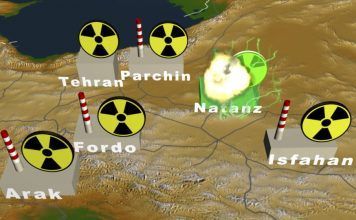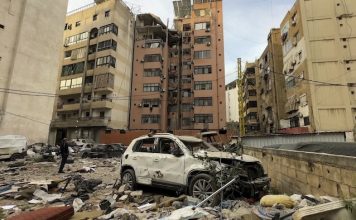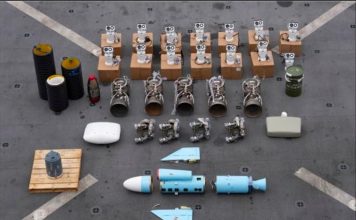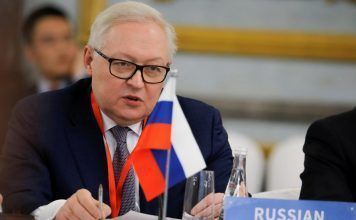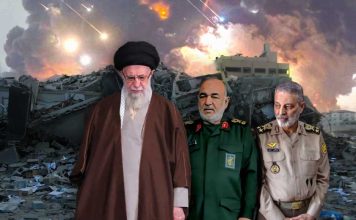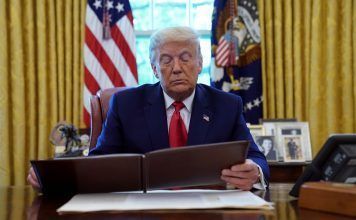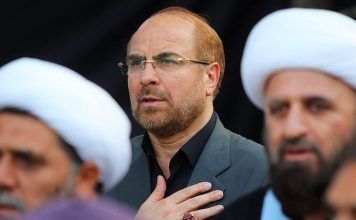By Ahmad Rafat
Western governments and politicians have finally focused their collective attention on the nationwide protests in Iran, sparked by the death of Mahsa (Zhina) Amini, a 22-year-old woman, who died while in the custody of the morality police in Tehran on Sept. 16.
The widespread protests in the past five weeks have forced Western governments to shelve — for now — the fruitless talks on reviving the 2015 Joint Comprehensive Plan of Action (JCPOA), the Iran nuclear deal.
Meanwhile, Western governments have released a series of statements condemning the brutal crackdown against the “Women, Life, Freedom” movement in Iran and added the names of several senior Iranian officials and organizations to the list of entities under sanction.
[aesop_image img=”https://kayhanlife.com/wp-content/uploads/2022/10/no-385-iri-end.jpg” panorama=”off” credit=”Illustration by KL./#IranProtests, October 2022. KL./” align=”center” lightbox=”on” captionsrc=”custom” captionposition=”left” revealfx=”off” overlay_revealfx=”off”]
However, the latest sanctions are not the results of the Islamic Republic’s human rights violations of its people. They are rather prompted by its sale of drones to Russia, which used to attack Ukraine.
What finally persuaded Western countries to abandon their policy of appeasement towards the Islamic Republic has been the courage of thousands of protesters for the past five weeks, who have persisted despite the deaths of some 300 people, including 42 children, and the arrest of a few thousand young people.
The massive uprising, which some have described as a revolution, has made Mahsa (Zhina) Amini’s name and the slogan “Women, Life, Freedom” famous worldwide. People on five continents have poured into the streets, shouting “Mahsa” and “Women, Life, Freedom” in solidarity with Iranian women and against the Islamic Republic.
The unprecedented support for the protests in Iran proves the movement’s global appeal and effectiveness. The scale and scope of support for the movement in Iran and the global condemnation of the Islamic Republic were unimaginable until recently.
On Oct. 20, Canadian Foreign Minister Melanie Joly hosted a virtual meeting of 14 female foreign ministers to discuss the recent events in Iran. Foreign ministers from Germany, Chile, New Zealand, Norway, France, Albania, Andorra, the Central African Republic, Iceland, Kosovo, Libya, Liechtenstein, Mongolia, and Panama participated in this unprecedented meeting.
U.S. President Joe Biden and his administration’s response to the events in Iran has also been notable. For the first time, a Democratic administration refrained from inviting Islamic Republic lobbyists to attend a State Department meeting to exchange views on the Iran situation.
In separate meetings with U.S. Secretary of State Antony Blinken, Iranian-born British actress Nazanin Boniadi and Roya Hakakian, an Iranian-American author and journalist, and several members of the Washington-based National Iranian American Council (NIAC), highlighted the plight, concerns, and demands of the Iranian people.
Actress Nazanin Boniadi Speaks Out After Mahsa Amini Death, Iran Protests
Ms. Boniadi also held talks with U.S. Vice President Kamala Harris and US National Security Advisor Jake Sullivan.
During his latest trip to California, President Biden urged a group of Iranian-Americans to “keep fighting,” adding, “We are with you.” It was inconceivable until recently for a U.S. Democratic president to utter such words.
There are also reports that after returning to Washington, Mr. Biden spoke to Elon Musk about using the Starlink satellite communications system to provide internet service to the Iranian people, as he has done for Ukraine.
In another extraordinary development, former U.S. President Barack Obama admitted that his administration had made “a mistake” by not supporting the protests and the “Green Movement” in 2009 in Iran.
Mr. Obama’s admission may have some connection with the U.S. mid-term congressional elections in November.
The election forecast does not favor the Democrats. The lack of support for the protests in Iran could further damage their chances of maintaining their majority in the House of Representatives and half of the seats in the Senate.
However, it is best to adopt a “glass half full” attitude and view current developments positively.
We cannot ignore the crucial role that Iranians and opposition groups abroad have played in recent events. It is rare for opposition groups abroad to be as effective as they have been since the death of Mahsa Amini.
Many Iranian politicians with dual citizenship have played a critical role in recent events, including Narges Eskandari-Grünberg, Mayor of Frankfurt am Main; and Masud Gharahkhani, President of the Parliament of Norway, the Stortinget (Storting).
People in the entertainment industry, artists, authors, musicians, captains of industry, famous social media influencers, and even a member of the British royal family have supported the “Women, Life, Freedom” movement.
During an event in Los Angeles on Oct. 18, the Duchess of Sussex, Meghan Markle, who is married to Prince William, wore a T-shirt inscribed with the slogan “Women, Life, Freedom,” written in Farsi.
The international community is increasing pressure on Iran’s despotic and oppressive regime. The Islamic Republic is in a tight spot. Striking workers in various sectors have joined the protesters in Iran now.
The Islamic Republic is cornered and trying to escape by creating a regional crisis and taking hostages. In the last month, Iranian authorities have arrested at least 23 foreign nationals, mostly Europeans, accusing them of “organizing the protests.”
Iran has also accused Tehran’s British, French, and German embassies of organizing the protests.
According to an Italian diplomat, Iranian Foreign Minister Hossein Amir-Abdollahian allegedly warned his Italian counterpart during a conversation that the Italian citizen arrested during the protest would remain in prison for a long time if the West continued its policy of pressure and sanctions against Iran.
The alleged threat could be why many European countries have been “cautious” in handling Iran, given that several of their citizens are currently in Iranian prisons.
However, these tactics and threats will not be effective in the long run. The world is losing patience with the Islamic Republic and its aggressive policies and bullying tactics, which create nothing but tension and conflict.
These may well be the dying days of the regime that has taken the Iranian people hostage for the past 43 years.


